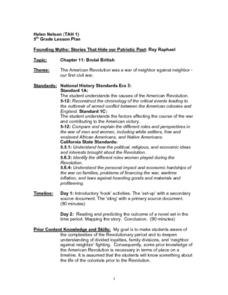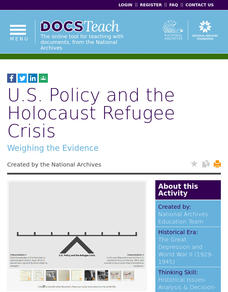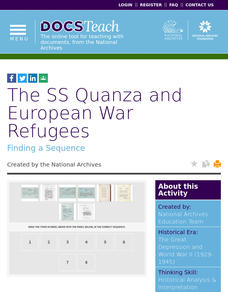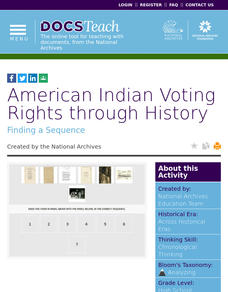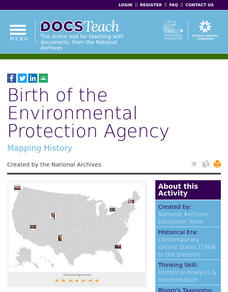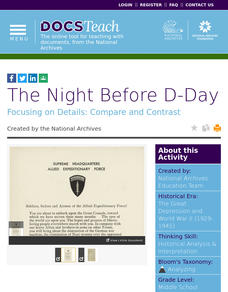Curated OER
Holes
Students distinguish between primary and secondary sources when researching on the Internet and evaluating historical records. They recognize important features of a primary source such as the type of document, who created it, what is...
Curated OER
Trouble in the Fields: Mexican Migrant Workers
Students become curators and museum reviewers for an online gallery using a selected group of primary sources on Mexican migrant workers. They share and reflect on their own and each other's ideas though participation in an on-line...
Curated OER
Brutal British
Students read and predict the outcome of a story set during the Civil War, then map the story. To prepare for the activity, students determine why it is important to look at historical events from all angles by using primary and...
Curated OER
Man's Best Friend:The Old Drum Story
Young scholars explore the Missouri courts. For this primary sources lesson, students examine the Missouri court case Burden v. Hornsby as well as other primary documents and narratives relating to the case. Young scholars analyze the...
Curated OER
The Story Was in the Details
Students explore and analyze primary documents from historical women's diaries. They conduct Internet research, develop conclusions about the primary documents, answer questions, and present their information to the class.
Curated OER
American Soldiers’ Experiences During WWI
Students investigate the effects of war on soldiers. In this World War I lesson, students link to the provided Web link to locate primary sources about American soldiers during the war. Students write historical narratives based on their...
Curated OER
Latinos and the Fourteenth Amendment: A Primary Source Document Activity
Eighth graders explore the effect of the Fourteenth Amendment. In this US History lesson, 8th graders read and analyze primary source documents. Students write a three minute paper demonstrating their understanding of the...
Curated OER
Examining the Spanish Flu of 1918
Eighth graders take a closer look at the Spanish influenza breakout of 1918. In this research skills lesson, 8th graders examine primary sources gathered by their instructor and identify how communities prepared (or did not prepare for)...
Curated OER
Stories of the Wrights' Flights
Students examine primary sources to understand the work of Wright Brothers. In this aviation history instructional activity, students study how primary documents and images are analyzed and write essays about the signifcance of...
Curated OER
A Document-Based Essay on Korean Social Change
Learners interpret historical evidence presented in primary resources. In this Korean history lesson, students examine the provided information on life in Korea. Learners respond to the questions that accompany each source. Students then...
Judicial Branch of California
A New Constitution….Your Turn!
It's the 1700s, and while returning home from the Constitutional Convention, pupils are propelled to 2777. The United States— emerging from a period of unrest and war—needs help developing a new constitution! Using the material from the...
Historical Thinking Matters
Social Security: 1 Day Lesson
Should the United States provide relief for those who are unemployed? Trace this question back to the Great Depression with your young historians, who will engage in careful reading of historical documents and classroom discussion...
DocsTeach
U.S. Policy and the Holocaust Refugee Crisis
How did the United States respond to the Holocaust refugee crisis during World War II? The activity focuses on the United States' foreign policies and the arguments for and against offering assistance. Scholars analyze historical...
DocsTeach
The SS Quanza and European War Refugees
World War II not only resulted in major loss of life, but it also displaced thousands of people. An eye-opening activity uses primary documents to explore the refugee crisis during World War II. Scholars compare the event to modern-day...
DocsTeach
American Indian Voting Rights through History
Vote ... it's your right! An enlightening lesson examines the history of voting rights for Native Americans. Leaners analyze primary documents and place them in chronological order. Academics also create a list of other events that took...
DocsTeach
Birth of the Environmental Protection Agency
Seeing is believing when it comes to climate change. An informative activity explores the creation of the Environmental Protection Agency (EPA) and its efforts to document environmental issues with photographs. Academics match images...
DocsTeach
Senators' Pay in the First Congress
Senators are public servants but they do get paychecks. The activity focuses on historical analysis and a treasury document from the first Congress. Scholars read the document, answer questions, and participate in group discussion to...
DocsTeach
Exploring America's Diversity: Rosalia Fundaro (Beginner)
Elementary scholars learn about the life of Rosalia Fundaro, an Italian immigrant, using primary sources. They analyze documents, complete written prompts, and participate in group discussion to understand Rosalia's life in the United...
DocsTeach
Inevitable Accident or Wrongful Act: Judging the Titanic Disaster
The unsinkable ship that sunk. Scholars review the case against the White Star Line following the tragic loss of life from the Titanic disaster. Academics read documents and organize them into arguments for and against the cruise line....
DocsTeach
The Night Before D-Day
Get inside the mind of General Eisenhower regarding the D-Day invasion. An interesting activity uses historical documents to highlight the differences between Eisenhower's public stance on D-Day and his private opinions. Scholars analyze...
Smithsonian Institution
Hidden Histories: Mexican Repatriation During the 1930s
Mexican Repatriation: the forgotten deportation of American citizens. The resource focuses on the deportation of Mexican American citizens during the Great Depression. Young historians read documents, complete a free-write, and fill out...
DocsTeach
"We Are Badly in Need of a Breath of Fresh Air": A Letter to President Kennedy About LGBTQ+ Rights
The 1960s were a pivotal time for many Americans who had long been discriminated against. Scholars read a document addressed to President Kennedy in support of LGBTQ+ rights and why they are essential. The activity includes group...
DocsTeach
Analyzing a Letter About American Indian Voting Rights
An informative activity focuses on the law preventing Native Americans from voting until 1947. Scholars read documents from the Office of Indian Affairs, complete an online worksheet, and participate in group discussion. Academics learn...
DocsTeach
Containment in Korea: Entering the Korean War
An interesting resource explores President Truman's decision to enter into the Korean War to contain the spread of communism. Historians analyze the document using an online worksheet before participating in group discussion on the...


